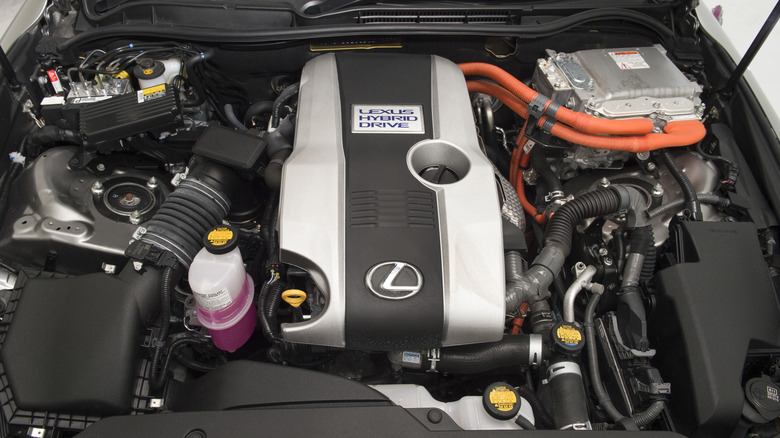Are Lexus And Toyota Engines Made In The Same Factory?
Toyota has spent nearly a century building a reputation for manufacturing affordable vehicles as safe, reliable, and fuel-efficient as they are stylish. But for auto enthusiasts who prefer a little more power and panache when they're behind the wheel, Toyota might be better known as the parent company of the luxury auto brand Lexus. In fact, Toyota has owned the luxury car brand since 1983, when the company's then-sitting president, Eiji Toyoda, founded Lexus in hopes of building "a car that is better than the best in the world."
More than half a century later, Lexus forges ahead with that singular goal. While it's impossible to quantify the automaker's success in that noble endeavor, with more than 10 million cars sold worldwide, some luxury car enthusiasts would no doubt argue Lexus has more than succeeded. However, Lexus' ties to their less flashy parent company will likely never be completely severed, thanks in no small part to an extensive and ongoing history of shared design elements and vehicle components.
Case in point, the brand name Lexus wasn't even used in Japan until 2005, with Toyota releasing the luxury line under its own name in its home country until then. So, despite the obvious design and performance upgrades Lexus' legendary lineup of vehicles holds over Toyota, it's easy to question how different the two brands are. While the vehicles and their engines are sometimes manufactured in the same facilities, it's even easier to argue the similarities between Lexus and Toyota end there.
Lexus and Toyota not only share a lineage but also some production facilities
Lexus and Toyota previously shared a very cozy relationship. However, Lexus operates with more autonomy from Toyota these days, with the company now reportedly running many of its own design, engineering, and manufacturing facilities. Despite the autonomy, it's commonly understood that Lexus and Toyota still share production facilities in Japan and the United States. That fact ensures some of their engines are still made within the same factory walls.
Indeed, in a recent publication detailing Lexus' history, MotorTrend proclaimed in no uncertain terms that Toyota actually makes Lexus engines. Given the automotive giant's parentage over the luxury brand, it's hard to argue the point, though the article also points out that the shared lineage is a big part of why Lexus engines have generally proven more endurable and reliable than many other brands in the luxury automotive field.
From a design and performance standpoint, auto enthusiasts can agree that — apart from a shared platform or two — Toyota and Lexus vehicles don't have much in common. In all frankness, the luxury brand bests models manufactured by its parent company from the ground up, fronting a polish and craftsmanship that its more practical counterpart will never be able to match. Of course, Lexus' high-end price point also ensures the vehicles are rarely, if ever, in direct competition with those made by their parent company because, despite the saying, you can absolutely put a price on luxury.

